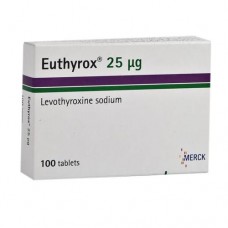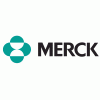Expiration date: 08/2027
Active ingredient: Levothyroxine sodium
Pharmacokinetics:
The ingestion is absorbed in the upper small intestine (up to 80% of the dose). Food intake reduces the absorption of levothyroxine. Cmax achieved after approximately 5-6 hours after administration. After picking up more than 99% of the drug is bound to serum proteins (thyroxine binding globulin, thyroxine binding prealbumin and albumin). In various tissues occurs monodeyodirovanie levothyroxine about 80% to form a triiodothyronine (T3) and inactive ingredients. Thyroid hormones are metabolized mainly in the liver, kidney, brain and muscles. A small amount of the drug undergoes deamination and decarboxylation as well as sulfuric acid and conjugated with glucuronic acid (in the liver). Metabolites are excreted by the kidneys and the bowel.
T1 / 2 - 6-7 days, at a thyrotoxicosis - 3-4 days in hypothyroidism - 9-10 days.
Description of the pharmacological actions:
Synthetic levorotatory isomer of thyroxine. After partial conversion to triiodothyronine (liver and kidney) and enter the cells of the body influences the development and growth of tissue metabolism. At low doses, has an anabolic effect on protein and fat metabolism, in the middle - stimulates growth and development, increase tissue oxygen demand, stimulates the metabolism of proteins, fats and carbohydrates, increases the functional activity of the cardiovascular system and central nervous system, in high - inhibits TSH production -rilizing hormone hypothalamus and pituitary thyroid stimulating hormone.
The therapeutic effect develops after 7-12 days and lasts for the same time after discontinuation of the drug. The clinical effect of hypothyroidism is manifested through 3-5 days. Diffuse goitre decreases or disappears within 3-6 months.
Testimony:
- hypothyroidism
- euthyroid goitre
- as replacement therapy for the prevention of goiter recurrence after resection of the thyroid gland
- thyroid cancer (following surgery)
- Graves' disease after achieving euthyroid state against the backdrop of thyreostatic therapy (a combination or monotherapy)
- as a diagnostic test for thyroid suppression.
Contraindications:
- Increased individual sensitivity to the drug
- untreated thyrotoxicosis
- untreated pituitary insufficiency
- untreated adrenal insufficiency.
Do not start treatment with the drug in the presence of acute myocardial infarction, acute myocarditis and acute pankardita.
Carefully:
- Coronary artery disease (atherosclerosis, angina pectoris, myocardial infarction)
- arterial hypertension
- arrhythmia
- diabetes
- heavy, long-existing hypothyroidism
- malabsorption syndrome (may require dose adjustment).
Application of pregnancy and breastfeeding:
During pregnancy and breast-feeding therapy with Euthyrox continues. During pregnancy, you want to increase the dose of the drug due to increased levels of thyroxine-binding globulin.
Use during pregnancy is contraindicated in combination with tireostaticheskimi means (as receiving levothyroxine may require increased doses thyreostatics). Since tireostatiki unlike levothyroxine can cross the placenta, the fetus may develop hypothyroidism.
During the period of breast-feeding should be taken with caution, strictly at the recommended doses, under a doctor's supervision. The amount of thyroid hormone secreted by breast milk during breast feeding (even during the treatment with high doses of the drug), is insufficient to cause any disturbances in the child.
Side effect:
With the proper use of the drug Euthyrox side effects are not observed. With increased sensitivity to the drug allergic reactions may occur.
The development of side effects may be due to an overdose of the drug (see. "Overdose" section).
Drug Interactions:
Levothyroxine increases the effects of anticoagulants, which may require a reduction in their dose.
The use of tricyclic antidepressants with levothyroxine may result in increased action of antidepressants.
Thyroid hormones may increase the need for insulin and oral hypoglycemic drugs. More frequent monitoring of blood glucose is recommended during periods of initiation of treatment with levothyroxine, as well as changes in its dosing regimen.
Levothyroxine reduces the effect of cardiac glycosides.
With simultaneous use of cholestyramine, colestipol and aluminum hydroxide reduces the plasma concentration of levothyroxine by its inhibition of absorption in the intestine. Therefore levothyroxine be applied for 4-5 hours prior to receiving these drugs.
While the use of anabolic steroids, asparaginase, tamoxifen possible pharmacokinetic interaction at the level of protein binding.
In an application with phenytoin, dikumarol, salicylates, clofibrate, furosemide in high doses increases the content of unbound plasma proteins levothyroxine blood.
Admission estrogensoderjath drug increases levels of thyroxine-binding globulin, which can increase the need for levothyroxine in some patients.
Growth Hormone while the use of levothyroxine may accelerate the closure of the epiphyseal growth zones.
Admission phenobarbital, carbamazepine and rifampicin may increase the clearance of levothyroxine and require increasing doses.
Dosage and administration:
Inside, in the morning on an empty stomach (at least 30 minutes before meals), not liquid, squeezed small amount of liquid (half a glass of water). The daily dose is adjusted individually.
In replacement therapy of hypothyroidism in patients younger than 55 years without cardiovascular disease prescribe a dose of 1.6-1.8 mg / kg / day over 55 or with cardiovascular diseases - 0.9 mcg / kg / day. With a significant obesity calculation should be made on the "ideal weight".
|
Hypothyroidism |
|
|
The initial stage of replacement therapy in
hypothyroidism |
|
|
Patients with cardiovascular disease under the age
of 55 years |
Initial dose: Women - 75-100 mg / day, men - 100-150
mg / day |
|
Patients with cardiovascular disease or older than
55 years |
The initial dose - 25 mg / day Increase to 25 mg every 2 months to normalization of
TSH levels in the blood When cardiac symptoms or worsening of cardiac
therapy correction is carried out |
|
The recommended dose for L thyroxine treatment of
congenital hypothyroidism |
||
|
Age |
The daily dose of levothyroxine mcg |
The dose of thyroxine l per body weight, mg / kg |
|
Up to 6
months |
25–50 |
10–15 |
|
6–12 months |
50–75 |
6–8 |
|
1–5 years |
75–100 |
5–6 |
|
6–12 years |
100–150 |
4–5 |
|
Older than
12 years |
100–200 |
2–3 |
|
Testimony |
The recommended dose of levothyroxine, mg / day |
||||
|
Treatment
of euthyroid goiter |
75–200 |
|
|||
|
Prevention of relapse after surgery for euthyroid
goitre |
75–200 |
|
|||
|
In the treatment of hyperthyroidism |
50–100 |
|
|||
|
Suppressive therapy of thyroid cancer |
150–300 |
|
|||
|
Thyroid
suppression test |
For 4 weeks prior to the test |
For 3 weeks prior to the test |
For 2 weeks prior to the test |
For 1 weeks prior to the test |
|
|
75 |
75 |
150–200 |
150–200 |
|
|
Infants administered in a daily dose of 1 reception 30 minutes before the first feeding dissolving tablet in water to give a fine suspension just before taking this medication. In patients with severe, long-existing hypothyroidism initial dose - 12.5 mg / day, with a gradual increase of 12.5 mg / day every 2 weeks to maintenance. Such patients often need to determine the level of TSH in the blood.
In hypothyroidism, drug taking, as a rule, throughout their lives. When thyrotoxicosis is used in combination therapy with tireostatikami after achieving euthyroid state. In all cases, the duration of treatment determined by the doctor.
Overdose:
Symptoms: (typical for thyrotoxicosis) - palpitations, cardiac arrhythmias, heart pain, anxiety, tremors, insomnia, sweating, loss of appetite, diarrhea, decreased body weight.
Treatment: reduction of the daily dose, a break in treatment for a few days, the appointment of beta-blockers.
After the disappearance of side effects of treatment should be started with caution, with the lower dose.
Special instructions:
In hypothyroidism, caused the defeat of the pituitary gland, it is necessary to find out whether the patient has both adrenocortical insufficiency. In this case, the substitution therapy corticosteroids should be initiated prior to treatment of hypothyroidism with thyroid hormone to prevent the development of acute adrenal insufficiency.
The drug has no effect on the professional activity associated with driving vehicles and management mechanisms.











